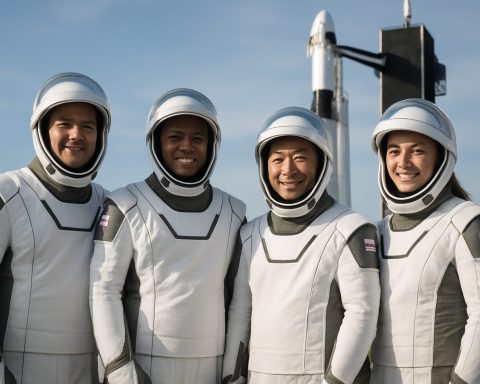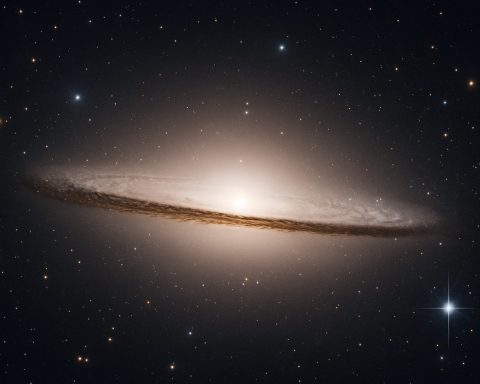- The Progress MS-30 spacecraft embarks on a mission that honors pioneering cosmonaut Pavel Belyayev, celebrating what would have been his 100th birthday.
- Adorned with commemorative emblems, the rocket pays tribute to Belyayev’s leadership of the first spacewalk mission, marking its 60th anniversary.
- Progress MS-30 carries essential supplies for the International Space Station (ISS), including clothing, food, and medical provisions.
- The mission supports scientific endeavors with materials for experiments in micro-algae cultivation, microorganism studies, and semiconductor crystal creation.
- A new Orlan-MKS spacesuit, reflecting Belyayev’s legacy, is delivered, continuing his influence on modern space exploration.
- This mission underscores the importance of acknowledging past achievements while pursuing future exploration.
A massive rocket stands poised under the vast Kazakh sky, its payload bearing a tribute etched in history. Drawing eyes from Earth and beyond, this celestial courier is about to embark on a mission steeped in homage—a journey that celebrates a pioneering cosmonaut whose steps reshaped the space frontier.
As the clock ticks towards launch at the Baikonur Cosmodrome, anticipation in the air is electric. The Progress MS-30, an uncrewed resupply spacecraft, carries more than just essential goods for the International Space Station. It dons a commemorative emblem, a vibrant blue and white homage to Pavel Belyayev, who in 1965 commanded the first mission to perform a spacewalk. This noble badge of honor captures Belyayev’s indomitable spirit, echoing across space and time, marking what would have been his 100th birthday.
This poignant symbol is not alone. On another side of its launch shroud, another emblem marks the 60th anniversary of Belyayev’s legendary spacewalk with Alexei Leonov aboard the Voskhod 2. The rocket, adorned with these tokens of human daring, will streak through the stratosphere, carrying its precious cargo into the annals of history.
As Progress MS-30 docks seamlessly with the space station after a two-day pursuit, it will deliver a bounty of modern treasures to the cosmonauts aboard. Awaiting them are supplies essential for sustaining life in the void—clothing, food, and medical provisions, alongside cutting-edge materials destined to push scientific frontiers. These include experiments with micro-algae cultivation, tools for understanding microorganism impacts, and apparatus for crafting semiconductor crystals.
Belyayev’s legacy is stitched into the very fabric of this mission, with the delivery of a new Orlan-MKS spacesuit, a technological descendant of the suit worn for that first tentative venture into the void.
The station’s crew will offload the bounty, relying on these resources to forge pathways into new scientific realms. Yet, this mission’s heart lies in its celebration of the past—for even as the spacecraft returns to Earth in a fiery farewell, its story of exploration and tribute will linger, a beacon of inspiration for future generations.
The key takeaway: As we advance into the cosmos, it is the courageous strides of those before us that map our journey, reminding us to honor our past while we dare to explore what lies ahead.
Unveiling Space Legacies: Discover the Rich Tapestry of Progress MS-30’s Historic Mission
Honoring a Space Pioneer: The Story of Pavel Belyayev
Pavel Belyayev, commanding the historic Voskhod 2 mission in 1965, helped pave the way for human space exploration. The Progress MS-30 mission, launched from the Baikonur Cosmodrome, is a profound homage to his contributions. It not only commemorates what would have been Belyayev’s 100th birthday but also marks the 60th anniversary of his iconic spacewalk with Alexei Leonov.
Breakthroughs Aboard the Progress MS-30
Beyond tributes, the Progress MS-30 mission brings critical supplies and innovative experiments to the International Space Station (ISS):
1. Life-Sustaining Supplies: Essential items such as clothing, food, and medical provisions are crucial for the well-being of the cosmonauts on the ISS.
2. Scientific Experiments: The payload includes experiments on micro-algae cultivation, which could revolutionize sustainable life-support systems in space. Investigation tools to study microorganisms’ impact in microgravity and apparatus for semiconductor crystal growth further the scope of space research.
3. Technological Advancements: The addition of a new Orlan-MKS spacesuit represents a leap in space equipment technology, directly descending from the suit used in the first-ever spacewalk.
Real-World Applications and Industry Trends
– Sustainability in Space: The micro-algae experiments could lead to sustainable oxygen and food production systems, not just for space missions, but also for Earth-based environmental solutions.
– Microgravity Research: Understanding microorganism behavior in space can influence medical and scientific breakthroughs on Earth, offering insights into new treatment and prevention methods for various diseases.
– Crystal Growth: Semiconductor research in space aims to create purer materials, potentially improving electronic devices’ efficiency and performance back on Earth.
Market Forecast and Industry Trends
The space industry is projected to grow exponentially, with more countries and private sectors investing in space exploration. The technological advancements and experiments conducted aboard missions like Progress MS-30 contribute directly to this growth, fostering new economic opportunities and innovation in aerospace technology.
Pressing Reader Questions
– Why are tributes like those on Progress MS-30 significant?
These tributes serve to honor the pioneers whose daring actions enabled current and future explorations. They remind us of the human spirit’s resilience and innovation.
– How do these missions impact everyday life on Earth?
Space missions drive technological innovation. Research conducted in space can find applications in medical, environmental, and industrial fields, ultimately benefiting daily life on Earth.
Pros and Cons Overview
Pros:
– Strengthening international space collaboration and research.
– Advancements in sustainable space travel and habitat technologies.
– Enhanced understanding of biological and physical processes.
Cons:
– High costs associated with space missions.
– Potential risks of technical failures or accidents during missions.
Actionable Recommendations
– Stay informed about space missions and their impact on everyday technology and science through reputable channels like NASA’s website or the European Space Agency’s page.
– Consider exploring educational programs and resources to better understand the broad implications of space research and how you might contribute to or benefit from this field.
For further exploration of space discovery and advancements, visit NASA and ESA.
These missions illustrate the limitless possibilities that lie ahead as we continue to honor the courage and vision of those who dared to explore space before us, creating a bridge between history and the future of exploration.









